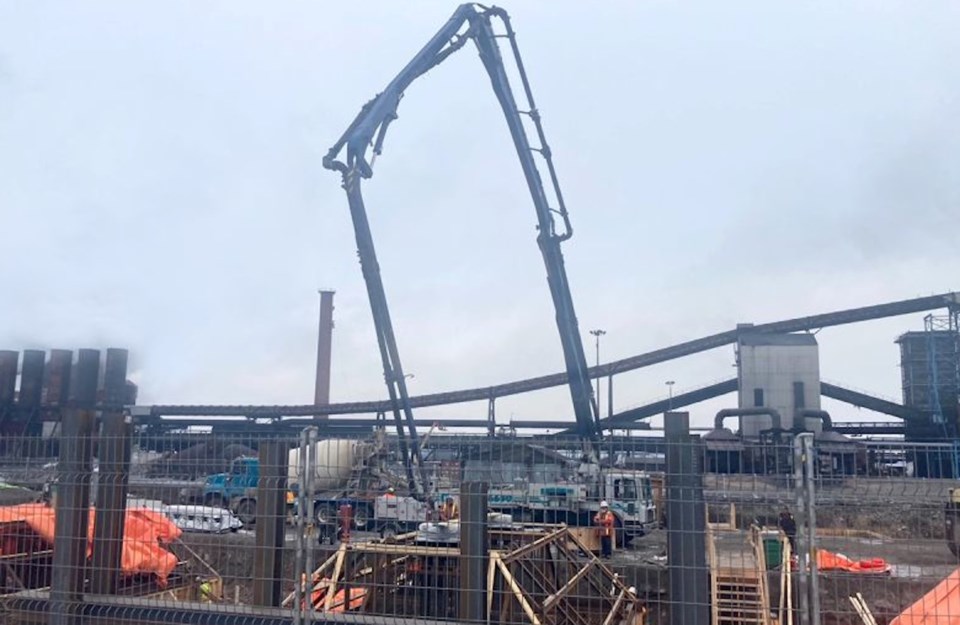Surging North American steel prices and demand led to a historic year for Algoma Steel.
The Sault Ste. Marie steel producer recorded $857.7 million in profit during its 2022 fiscal year, a stark contrast from the $76.1-million loss posted in 2021.
This week, the company announced its fourth-quarter and full-year results for its 2022 fiscal year, ending March 31.
Income from operations amounted to more than $1.4 billion, way up from the $84.8 million recorded during the 2021 fiscal year.
Cash flows generated from operations exceeding $1.2 billion, much improved from the $8.1 million posted during the same period the previous fiscal year.
Fourth-quarter revenue totalled $941.8 million, almost double from the $638.5 million listed during the same quarter last year. Algoma saw a nice quarterly profit at $242.9 million.
Company management said the fourth quarter capped off what they termed an “incredible” but also a “tumultuous year” for Algoma that produced record revenues, profitability and cash flow.
Algoma makes sheet and plate steel products for a North American customer base of roughly 150, but mostly for the automotive industry.
The company shipped 2,297,159 tons during the year, up slightly from the 2,102,086 tons from the previous year.
Shipments were lower than expected, which was attributed to issues beyond their control, with logistical and supply change problems at the customers' end, and pandemic-related challenges. The cost of raw materials, especially iron ore, scrap and alloys, increased during the year and are expected to increase some more in the months ahead.
Already healthy steel prices spiked to near-record levels this spring, largely attributed to the Russian invasion of Ukraine.
While prices have levelled off since April, Algoma said prices remain attractive and expectations are they will stay strong based on the demand for steel, especially plate, from the automotive, construction and oil and gas sectors.
In a June 15 webcall to analysts, Algoma’s new CEO, Michael Garcia, said certain industrial supply chains continue to struggle. The auto industry, for example, is facing challenges to produce more vehicles.
Based on that unmet consumer demand, Algoma management remains “pretty bullish” on the resulting steel demand heading into the new fiscal year, based on what they currently see in the order book and in the healthiness of the used car market.
Garcia recently replaced Mike McQuade, who led Algoma when it emerged from creditor protection three and a half years ago. McQuade will remain on Algoma’s board of directors.
During his opening remarks, McQuade called his years at Algoma “some of the most rewarding of my career.”
He characterized the 2022 fiscal year as a time of “profound change” at the company that saw a return to the markets, the retirement of a considerable long-term debt, and the start of construction of a new electric arc furnace (EAF) complex.
The two dual furnaces are slated to come online in 2024 and will wean Algoma off of coal-fired and blast furnace steelmaking for the first time since the company’s founding at the turn of the last century.
The $700-million project will give Algoma annual steel production capacity of 3.7 million tons, matching their downstream steel finishing capacity. The furnaces will cut Algoma’s carbon emissions by 70 per cent.
The construction schedule and project appears on time and on budget.
Algoma maintains the EAF will position them as a “next generation” steelmaker.
“It’s an exciting time and a bright future for Algoma,” said McQuade.
The company is also making $120 million worth of upgrades to its plate mill, expected to be completed by November. It’ll boost the rated capacity from 350,000 tons a year to 700,000 tons.
Garcia said he’s excited about the quality of plate Algoma will bring to the market as they can already see the “quality jump” with hot trials currently underway.
Knowing the wildly cyclical nature of steel markets, Garcia said the company will stay the course when it comes to taking a disciplined approach in managing cash, given the volatile pricing market over the last several quarters.
While Algoma expects to be a significant generator of free cash over the long term, Garcia said he will follow McQuade’s stated approach to “live within our means, not to spend money we didn’t have or expect to realize down the line.”
Algoma is in negotiations with its two unions on new contracts. The existing contracts expire at the end of July.
Garcia said Algoma hasn’t experienced a strike more than 30 years and he expects conversations will stay productive over the next several weeks.
He didn’t provide much follow-up information on what could be substantial government fines coming from a recent oil spill incident on the property that dumped more than 20,000 litres into the St. Mary's River.
Garcia said they’ve discussed the situation with Algoma’s insurers but he couldn’t provide any information on a final determination or the size of a fine.
He called it a “very disappointing incident,” noting that the source of the spill was safely contained, all the appropriate officials were notified, and that Algoma was working through the required next steps.




.jpeg;w=120;h=80;mode=crop)